The differences between mariadb and mysql are: 1. Mysql is a relational database management system, while MariaDB is a branch of MySQL; 2. MariaDB was developed by the father of MySQL and its purpose is to be fully compatible with MySQL ;3. XtraDB replaces MySQL's InnoDB, etc.

The operating environment of this article: Windows 7 system, Mysql version 5.7.14, Dell G3 computer.
What are the differences between mariadb and mysql?
A brief discussion on the difference between MySQL and MariaDB (performance comparison between mariadb and mysql)
Introduction to mysql:
MySQL is a relational database The management system was developed by the Swedish MySQL AB company and is a product of Oracle. MySQL is one of the most popular relational database management systems. In terms of WEB applications, MySQL is one of the best RDBMS (Relational Database Management System) application software.
MySQL is a relational database management system. A relational database stores data in different tables instead of placing all data in one large warehouse, which increases speed and flexibility.
The SQL language used by MySQL is the most commonly used standardized language for accessing databases. MySQL software adopts a dual licensing policy and is divided into community version and commercial version. Due to its small size, fast speed, low total cost of ownership, and especially the characteristics of open source, MySQL is generally chosen as the website database for the development of small and medium-sized websites.
Introduction to MariaDB:
The MariaDB database management system is a branch of MySQL, which is mainly maintained by the open source community and is licensed under the GPL. One of the reasons for developing this branch is that after Oracle acquired MySQL, there was a potential risk of closing MySQL as a source, so the community adopted a branch approach to avoid this risk.
MariaDB aims to be fully compatible with MySQL, including API and command line, making it an easy replacement for MySQL.
MariaDB was developed by Michael Widenius, the founder of MySQL. He had earlier sold the company he founded, MySQL, to SUN for US$1 billion. Since then, as SUN was Acquired by Oracle, the ownership of MySQL also fell into the hands of Oracle.
The name MariaDB comes from the name of Michael Widenius’s daughter Maria (English: Maria).
MariaDB until version 5.5 follows the MySQL version. Therefore, people using MariaDB 5.5 will know all the features of MariaDB from MySQL 5.5. Starting from version 10.0.0, which was released on November 12, 2012, it no longer follows the MySQL version number. Version 10.0.x is based on version 5.5, plus functions transplanted from MySQL version 5.6 and new functions developed by ourselves.
In terms of storage engines, XtraDB (named Aria) will be used instead of MySQL's InnoDB starting from version 10.0.9.
MariaDB’s API and protocol are compatible with MySQL, and some features have been added to support local non-blocking operations and progress reporting.
This means that all connectors, libraries and applications that use MySQL will also work under MariaDB.
On this basis, due to concerns about a more closed software project of Oracle MySQL, Fedora plans to replace MySQL with MariaDB in Fedora 19
MYSQL I believe everyone knows what it is. .
So what exactly is mariadb?
MariaDB database management system is a branch of MySQL. It was developed by Michael, the father of MySQL. One of the reasons for developing this branch is that after Oracle acquired MySQL, there was a potential risk of closing MySQL as a source, so the community adopted a branch approach to avoid this risk.
So between the two Who has better performance and who has worse performance? Let’s do a simple test on the same computer now
My laptop environment is
cpu:I3
hard drive : Ordinary mechanical hard drive (5400 rpm)
Memory: 8G
System: win10 64-bit
MYSQL version: 5.6
mariaDB version: 10.3
The following is to create databases and tables in MYSQL and mariaDB and insert tens of millions of test data IDs as primary keys. Database engine: MyISAM
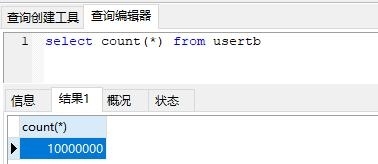
Query statements are all under Navicat Run
1. First query the 20 pieces of data after 9 million, which is the following statement
select * from usertb limit 9000000,20
The processing time of mysql is 3.09 Seconds
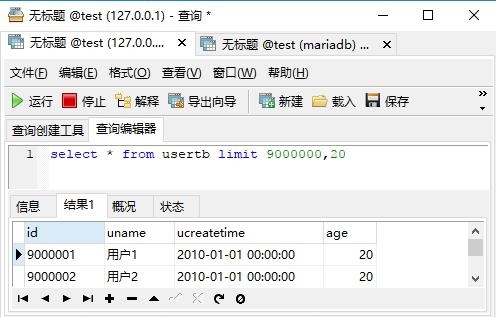
mariaDB’s running time is 1.89 seconds
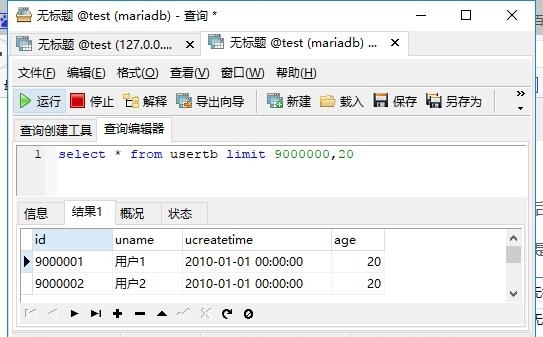
2. Query 20 pieces of data after 9 million pieces The reverse order according to ID is the following statement
select * from usertb order by id desc limit 9000000,20
MYSQL took 121.26 seconds
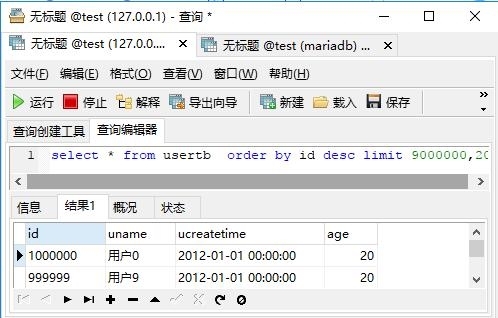
MariaDB took 75.73 seconds
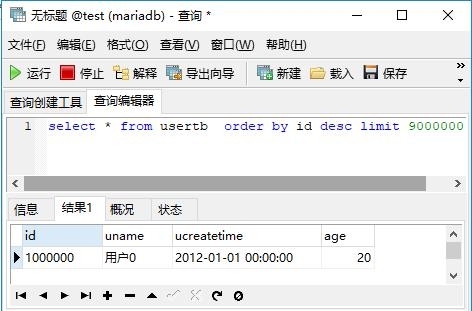
3. Finally, we change a SQL statement to test. Use the following SQL statement (a commonly used statement in MYSQL to optimize paging):
select * from usertb where id<(select id from usertb order by id desc limit 9000000,1) order by id desc limit 20
MYSQL took 3.13 seconds
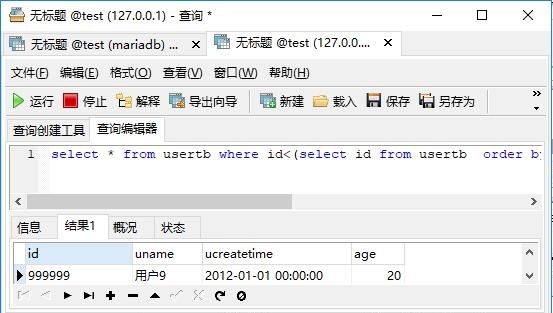
MariaDB took 70 seconds
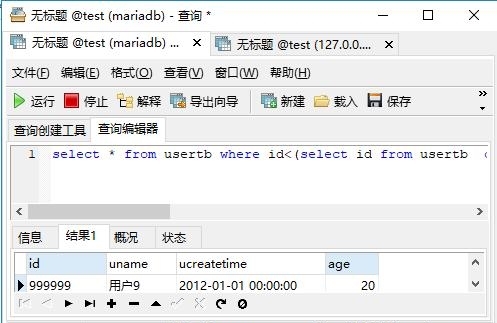
Summary: Both databases have their own advantages and just find their own suitable optimization method. I am a novice and don’t know how to optimize. The above is a boring test. Recommended learning: "
mysql video tutorial"
The above is the detailed content of What are the differences between mariadb and mysql?. For more information, please follow other related articles on the PHP Chinese website!